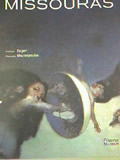






|

|
Morioka's personal diary
If you have any comments please use our feedback form.
Please visit our blog. |
 |
I have received, from Frissiras Museum in Athens, a book of paintings by the Greek painter, Tassos Missouras, who held a retrospective exhibition under the title of "Dream Navigator" in Greece. The title of the exhibition was borrowed from my book, Conscioussness Communication, published in 1993 in Japanese. I wrote about his painting in the post of April 9, 2006.
This is a thick, heavy, and beautifully made book that contains a number of his paintings from his early days to current works. There are some articles on his painting, however sadly, I can't read Greek. His paintings have something that stimulates the subconscious minds. This is probably why he was attracted to my term "dream navigator."
The following are parts of his paintings.



The last picture reminds me of Alice's Adventures in Wonderland by Lewis Carroll. Missouras' works might have some connections with the topics investigated in my book The Insensitive Man, particularly about men's interest in little girls.
There is little information about Tassos Missouras in English on the web. I would like to know more about his works.
Photo: Albany, NY, USA
What's New: .
Post a comment / See comments (Blog) |
 |
I am now preparing for a PowerPoint presentation for the conference, Japanese and Asian Bioethics in Context, to be held in Tuebingen, Germany, Sep.26-29. This is my second trip to Germany. I have never been to Tuebingen. I am looking forward to seeing the city and Tuebingen University.
I am going to talk about the "philosophy of life" found in the texts written by feminists and disabled people in the 1970s. In the second part of my presentation I am going to talk about the idea of "fundamental sense of security" and "human dignity" in the age of advanced technology.
You can see the whole program on the Tuebingen University's website.
27.09.2006
Workshop “The bioethical Discourse in Japan”
11:00-11:30 Introduction
Prof. Dr. Robert Horres (Tübingen University)
Director Yutaka Homma (Cultural Institute, Cologne, The Japan Foundation)
11:30-11:15 Prof. Susumu Shimazono (Tokyo University, Japan)
“Religion, Ethics and Biopolitics in Japan”
11:15-12:00 Prof. Dr. Jun Matsuda (Shizuoka University, Japan)
“Stem cell research in Japan and in Germany”
12:00-13:30 Lunch Break
13:30-14:15 Prof. Dr. Masahiro Morioka (Prefectural University of Osaka, Japan)
“Painless Civilization and Philosophy of Life: A philosophical challenge to overcome the limitation of Japanese bioethical discussions”
14:15-15:00 Prof. Dr. Ryûichi Ida (Kyoto University, Japan)
“Japanese Bioethics: A Model for Asia?”
15:00-15:30 Coffee Break
15:30-16:15 Prof. Dr. Yutaka Hishiyama (Science Council of Japan, Tokyo, Japan)
“Resolving Bioethical Conundrums: Sources of Orientation for the Japanese Administration”
16:15-17:45 Discussion “Structures and Characteristics of the bioethical Discourse in Japan”
28.09.2006
Bioethical Conflicts and Bioethical Discourse in Japan
10:00-10:45 Dr. Christian Steineck (Bonn University, Germany)
“Bioethics in the Academy: Ethical and Anthropological Traditions”
10:45-11:30 Dr. Ölschleger, Hans-Dieter (Bonn University, Germany)
“Values and attitudes towards bioethical issues in postwar Japan”
11:30-14:00 Lunch
14:00-14:45 Prof. Dr. Dr. h.c. Josef Kreiner (Bonn University, Germany)
“The religious Discourse”
14:45-15:30 Miki Olschina, M.A. (Tübingen University, Germany)
“Bioethical issues and the responsibility of Journalism in Japan”
15:30-16:00 Coffee Break
16:00-16:45 Prof. Dr. Robert Horres (Tübingen University, Germany)
“Biopolicy and Bioethical Conflicts”
16:45-18:00 Discussion “Japanese Approaches to the field of Bioethics”
29.09.2006
Asian Bioethics
09.30-10:10 Dr. Christian Steineck (Bonn University, Germany)
“Biolaw, Biopolicy and Bioethics in Japan: Mutual Relation or Splendid Isolation?”
10:10-10:50 Dr. Ole Döring (Bochum University, Germany)
“Politic, public opinions, professional discourse”
10:50-11:30 Dr. Phillan Joung (Bochum University, Germany)
“The ideological character of culturalistic argumentations in bioethical discourse —Korean perspectives—”
11:30-13:30 Lunch
13:30-14:30 Discussion “Asian Bioethics? Fact or Fiction”
14:30-15:30 Meeting of the Research group on Transcultural Bioethics
Photo: Albany, NY, USA
What's New: .
Post a comment / See comments (Blog) |
 |
Japan's new imperial baby was named Hisahito (BBC). The Japanese emperor must be male according to the Imperial Law, hence, many people have been waiting for the birth of a male baby in the imperial family. Personally, I don't understand why the emperor must be male, and it is clear that there are many people who think like me, but such discussion has disappeared from the mass media since last week.
In many Asian countries, such as China, Korea, and India, sex selection of children is accepted by ordinary people, and as a result, the number of male babies considerably exceeds that of female babies in those countries because parents usually prefer boys. Among those countries, Japan is an exception. In Japan, sex selection is strictly prohibited. Then, the question arises whether the majority of Japanese people prefer male babies just like our neighbour countries.
A research shows that there is no such preference among Japanese people as a whole. However, I have the impression that in recent years many people have hoped for a boy to be born in the imperial family. A conservative scholar insisted that the emperor must be a man because the important essence of an emperor has transmitted from a male emperor to his son, from generation to generation, inscribed on their Y chromosomes. (I think this is nonsense.)
Then, how do the imperial family think about it? The Asahi Shimbun Newspaper reported the press conference held on the day of the birth of the baby. Two doctors attended the conference. The following are the translation of the most interesting part of their remarks:
-- Asahi Shimbun: "Didn't Their Majesties know about the baby's sex?"
-- A doctor: "Their Majesties have talked to us that they don't want to know about the sex of the baby, information about whether the baby has a disability, and other things. ....."
-- The other doctor: "Their Majesties not only didn't want to know about them, but also strongly wished to welcome whatever baby they might have because it is their own baby. They said that they wanted to accept in a natural way, and asked us not to intervene in the birth process. These were truly impressive words."
If this is a true story, this shows that the imperial couple was against sex selection, prenatal screening and selective abortion. And this is good news to disabled people who have fought against prenatal screening and selective abortion. By the way, Japanese left-wing activists have objected to both the imperial system and selective abortion. How do they think about the above words uttered by the imperial couple? I am probably a left-wing thinker, but I want to support their words.
Photo: Albany, NY, USA
What's New: .
Post a comment / See comments (Blog) |
|
